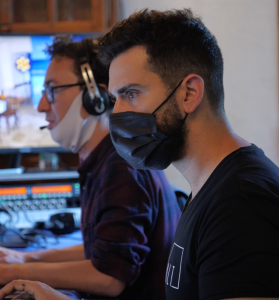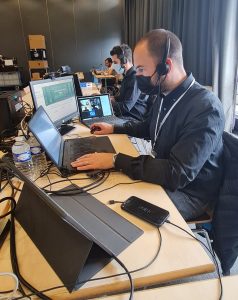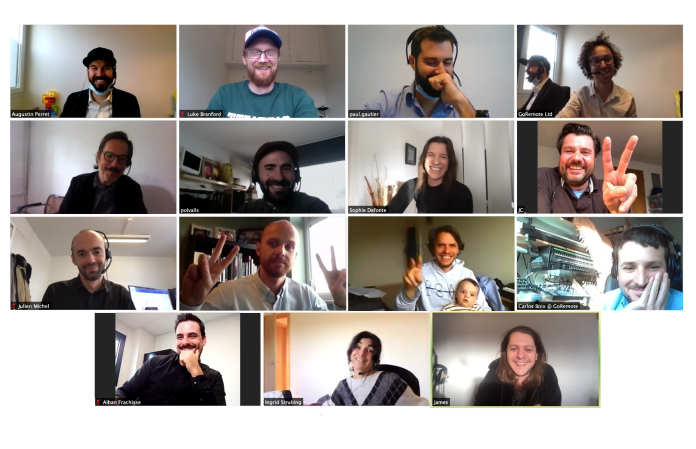SME caught up with Ben Axtell, below, co-founder of GoRemote, to find out more about the company
 Tell us a little about GoRemote, Ben. When was it formed, and what are its aims?
Tell us a little about GoRemote, Ben. When was it formed, and what are its aims?
For several years I had been building a video production agency in London but had always kept one foot in the events industry. When COVID struck, I was partway through a series of large events for Microsoft and had just returned from Johannesburg, Dubai and Prague. While waiting out the first UK lockdown, I and some other events managers began organising parties in Zoom. It gave us a chance to test the platform and chat together about where things might go. Gus, a good friend and experienced event production manager, had recently turned around an international congress from physical to virtual in eight days and he also had many clients struggling to adapt. We agreed the pandemic wouldn’t end anytime soon, and there might be opportunities to build something new. I reached out to another friend, Luke, who worked on large digital projects and database management.
Over the years of working in events, we’d built up a strong network of skilled producers, production managers, and technicians. As we started exploring ideas, one of the primary drivers was how we could not only solve client problems but also bring in work for our friends, each of whom were facing an uncertain future. It was clear that events would struggle to adapt to the new virtual world, but we could really help with this team. By mid-April, we had a name, registered the business, built a website and had an initial MVP in mind. This was the start of GoRemote.
How has the business developed?
 We took an iterative approach, driven by Luke’s background in agile project management. It was clear that a critical factor in the successful delivery of virtual events would be the speakers, who were struggling to adapt to this new virtual world. In a traditional venue, the technicians manage everything; all the speakers need to do is talk. But in a virtual environment, on top of presenting or chairing a session, they had to become AV and IT technicians, meaning far greater risk and potential for issues. With our skilled team, speaker management seemed a natural place to focus. By supporting speakers to give better sessions, events managers could deliver events efficiently, effectively, and of the highest quality.
We took an iterative approach, driven by Luke’s background in agile project management. It was clear that a critical factor in the successful delivery of virtual events would be the speakers, who were struggling to adapt to this new virtual world. In a traditional venue, the technicians manage everything; all the speakers need to do is talk. But in a virtual environment, on top of presenting or chairing a session, they had to become AV and IT technicians, meaning far greater risk and potential for issues. With our skilled team, speaker management seemed a natural place to focus. By supporting speakers to give better sessions, events managers could deliver events efficiently, effectively, and of the highest quality.
After a few small events, we landed our first big show, the Digital International Liver Congress 2020. It was a pan-European medical congress with ten virtual stages and hundreds of speakers attending online. Our role was to manage and ‘onboard’ the speakers, ensure they were briefed, technically solid and had all the support they needed before and during their session. We coined the term ‘Virtual Stage Manager’ to describe our team’s role. We quickly found that these larger-scale events, with large numbers of speakers, were where we provided the most value, so this became a focus. There were many new technological solutions at this time, but fundamentally events are about people, so we wanted to ensure this aspect was still supported.
Luke’s experience outside of events allowed him to come at the problem from a different perspective, challenging many of our preconceived ideas about how events were run. Over the following months, we expanded our team and began developing new tools bringing a more structured approach to what we did. It started with moving speaker management away from outdated spreadsheets to structured databases. We explored new ways we could support speakers on their journey to stage with each event. We began undertaking pre-event checks and briefing sessions with a custom booking system and reporting process. By the end of 2020, we’d built and tested a v1.0 of these initial tools and validated the business idea.
2021 was a busy year; we worked across various events, from small VIP conferences to congresses with over 700 speakers. We continued to expand our services and systems, providing email communications and calendar invites, PowerPoint and content upload tools, and a recording system to capture presentations before the event. We supported thousands of speakers, ranging from doctors to politicians, artists and billionaires, including high profile speakers such as Richard Branson, John Kerry, Justin Trudeau and Melinda Gates.
You were heavily involved in the Paris Peace Forum in 2020. Who was involved, and what were the challenges? 
We’ve worked on the Paris Peace Forum in both 2020 and 2021. The event brings together politicians, Nobel prize winners and other leading figures from across the world to discuss the biggest issues of our time. In 2020 the event was entirely virtual, and in 2021 took a hybrid approach with speakers, including President Macron and Vice President Kamala Harris, at the event in person.
Each event brought different challenges. The fully virtual nature of 2020, and the fact it was the first year held in this format, brought obvious logistical and communication challenges. At the time, we were still developing our core suite of tools, we were very much in beta, and it was a major test for our systems. We integrated new ideas specifically based on their needs, for example, a live speaker dashboard. Essentially a Kanban-style board where each speaker is a card so the team can see where they were en route to stage. It gave both the production and technical teams control and oversight of where any speaker was at any given time.
Another challenge was the high-profile nature of the speakers attending. We act as the face of the organisation, and it was critical to ensure the correct protocols were followed, particularly with royalty and government ministers. Our role was to provide that red-carpet experience and ensure they were technically ready and briefed for their session. This sometimes meant we only had a few minutes to prepare. One example, a very high-profile speaker joined us backstage at COP 21 in Glasgow only a few minutes before they were going live at the closing ceremony. At these critical moments, with high pressure, we still need to ensure the speaker is technically sound and prepared to deliver a seamless session.
How did you ensure the event ran smoothly?
One of the key factors in the successful delivery of any event is having the best team, and our biggest strength is our network of skilled VSMs. The systems we’ve developed bring efficiencies and structure to the processes, but our people are critical to what we do.
For the Paris Peace Forum, every speaker undertook pre-event briefings; this was critical in reducing issues on the day. Our speaker portal, where we keep the data and reports, has a real-time overview of where every speaker is leading up to the event. We enter every event looking to understand the big picture, and our wider events management background means we often go beyond just speaker management. We provide advice on tools and the event architecture and mitigate problems in other areas. This level of care and attention is almost always recognised as another factor in ensuring the events run as smoothly as possible.
You also worked with The European Society of Organ Transplantation Congress. What were the particular challenges there? 
The ESOT 2021 congress was a particularly interesting event, being the first large scale hybrid medical congress in Europe, if not the world. It was held at the end of August 2021 in Milan, when many countries were still in lockdown. However, there was just enough movement to have a physical and virtual element together. One of the critical challenges we found was speakers changing from a ‘physical’ status to ‘virtual’, either due to changes with COVID rules in their home country or needing to catch a return flight on that day. We had expected some of the issues, so we incorporated a transparent system with the events team to quickly adapt. It was interesting to see this in action, and it gave us an idea of what events would be like in the future. Speakers now know there is the option to attend virtually, so some will look at changing at the last minute. It’s vital for any event managers looking at a hybrid model to plan in advance, so they don’t get caught out.
In five years, what would be judged as ‘success.’
With the pandemic ending, we’re entering a new phase in the business. People want to meet in person, so events are moving back to a physical approach. Despite this, the last two years have been advancing significant opportunities, technologies, and understanding of how digital can be used in events. We are adapting to fit into this new space with a greater focus on hybrid.
We believe that a strong digital approach enhances the event experience. The physical aspect cannot be replicated but augmenting this with virtual brings huge opportunities. It means larger and more diverse audiences, more accurate data, and higher profile speakers, but importantly, it is a more sustainable and greener way to work. We aim to help event managers seamlessly combine these approaches to deliver world-class congresses and conferences when they have a digital component. As the sector matures, our tools and team will ensure event managers offer the highest quality virtual and hybrid event experiences.

